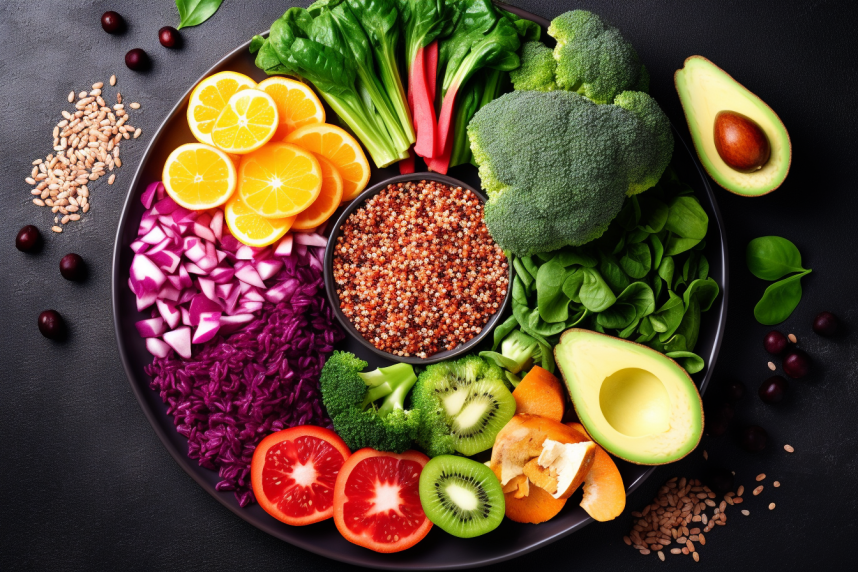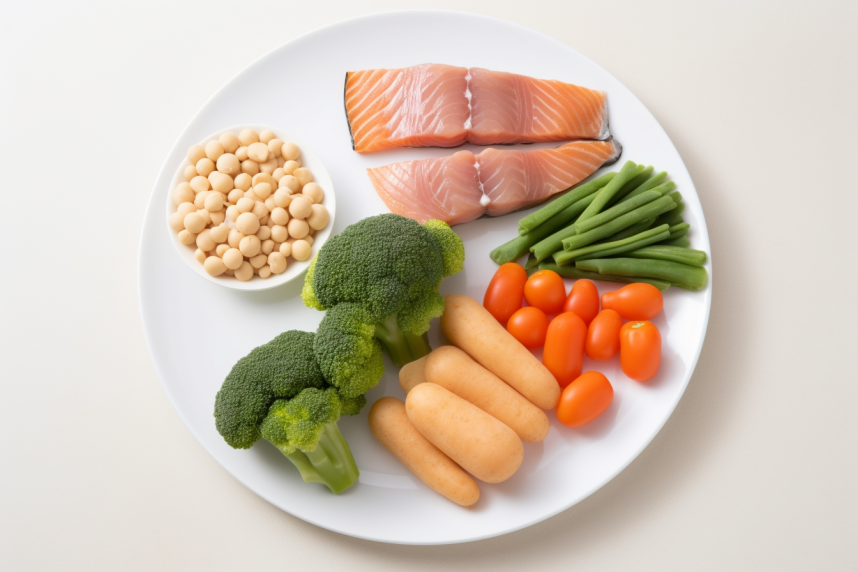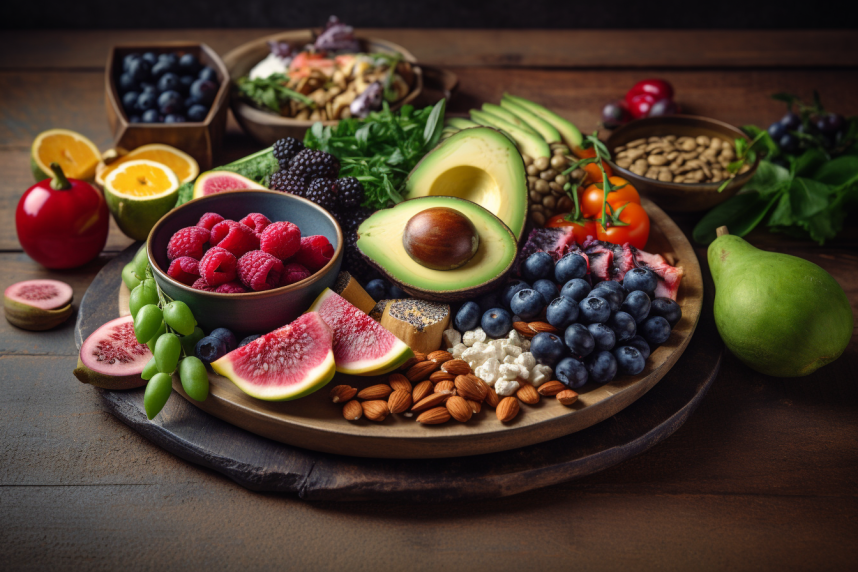Have you ever felt like you don’t quite know how to eat right? You are not alone! Eating the right foods in the right amounts is a challenge for many people.
In this article, you will learn the ultimate guide to balanced nutrition. We will cover the basics of balanced nutrition, nutrient groups, portion control, variety of foods, superfoods, and supplements.
You will gain the knowledge and understanding to create a balanced diet plan that is tailored to your individual needs. By the end of this article, you will have the tools to create a life-long healthy eating plan.
Understand the Basics of Balanced Nutrition

Get ready to learn the basics of healthy eating and find out how you can make the most of your meals! Eating habits are an important part of our daily lives, and the food choices we make can have a big impact on our overall health. By understanding the basics of balanced nutrition, you can develop healthy eating habits and lifestyle choices that will help you get the most out of your meals.
Your meals should include a variety of nutrient-rich foods from all the major food groups, including proteins, carbohydrates, fats, vitamins, minerals, and water. Eating a variety of these foods will ensure that you get all the essential nutrients your body needs to stay healthy.
Additionally, pay attention to serving sizes and portion control; eating too much of any food group can cause weight gain. Make sure to include physical activity in your daily routine to help maintain a healthy body weight.
Learn About Nutrient Groups

You may have heard of macronutrients and micronutrients, but do you know what they are and why they’re important for balanced nutrition?
Macronutrients are the nutrients that your body needs in large amounts and include proteins, carbohydrates, and fats. On the other hand, micronutrients are the vitamins and minerals that your body needs in small amounts.
Both macronutrients and micronutrients are essential for keeping your body functioning properly and maintaining optimal health. In this section, we’ll discuss the different nutrient groups and how they work together for balanced nutrition.
Macronutrients
Learning about macronutrients is essential for your health – you can’t make an omelette without breaking a few eggs!
Macronutrients are the three categories of nutrients that provide energy for your body: carbohydrates, proteins, and fats.
Carbohydrates are the primary source of energy for your body and can be found in starchy and sugary foods.
Healthy fats are essential for your body and can be found in avocados, nuts, and fatty fish.
Proteins are important for building and repairing tissues and can be found in eggs, dairy, and meat.
It’s important to include all three macronutrients in your daily diet to maintain a balanced and healthy lifestyle.
Incorporating a variety of healthy carbohydrate sources, such as fruits, vegetables, and whole grains, and healthy fats, such as avocados, nuts, and fatty fish, will help ensure that your body gets the proper nutrients it needs.
Micronutrients
Getting your daily dose of micronutrients is just as important as macronutrients for optimal health – they’re the essential vitamins and minerals that your body needs to function properly! Micronutrients are found in many of the foods we eat, but it can be difficult to identify which foods contain them.
By looking at food labels, you can determine which foods are good sources of micronutrients, and how much of them you’re getting per serving. Additionally, you can supplement your diet with vitamins and minerals to ensure that you’re getting the micronutrients your body needs.
Eating a balanced diet with a variety of nutrient sources is key to getting the right amount of micronutrients for your body. A diet rich in fruits, vegetables, whole grains, lean proteins, and healthy fats will help ensure that you’re getting all of the micronutrients your body needs.
Create a Balanced Diet Plan

Creating a balanced diet plan is essential for living a healthy lifestyle – let’s make sure we get it right! To create a nutritionally balanced diet plan, consider the following aspects:
- Meal planning: Meal planning is a great way to ensure balanced nutrition, avoid overeating, stick to your food budget, and save time.
- Food budgeting: Meal planning can help you stick to your food budget and save money.
- Eating foods from different food groups: Eating a variety of foods from different food groups is important. It will help you get the right amounts of essential vitamins, minerals, and other nutrients.
- Mindful eating: Mindful eating is essential. Pay attention to the food you are consuming and note how it makes you feel.
- Staying hydrated: Staying hydrated is a key component of nutrition. Drink plenty of water throughout the day to keep your body hydrated.
Remember, a balanced diet plan is crucial for a healthy lifestyle. So, make sure to consider these aspects while planning your diet.
Understand Portion Control

Controlling portions isn’t always easy, but it’s definitely worth the effort! Mindful eating is an important part of portion control that involves being aware of how much food you’re consuming. Practicing mindful eating can help you understand the appropriate amounts of food you need to reach your goals.
Planning meals ahead of time is another great way to ensure that you’re eating the right amounts. Planning out your meals in advance allows you to have a better idea of what to expect in terms of portion sizes and calorie counts.
Portion control is an essential part of a balanced diet plan, so it’s important to take the time to understand it and practice it regularly. With the right planning and mindful eating habits, you can easily maintain a healthy and balanced diet.
Eat a Variety of Foods

Eating a variety of foods is important for your health and wellness. Incorporate foods from all of the major food groups, such as whole grains, fruits and vegetables, lean meats, and fish, and dairy products.
Doing so will help you get the essential nutrients your body needs to stay healthy and energized.
Whole Grains
Whole grains are an essential part of a healthy diet, and they’re easier to incorporate than you might think! Whole grains provide a range of beneficial nutrients, including fiber, B vitamins, and minerals. Eating whole grains regularly can help reduce the risk of many health conditions, such as heart disease and Type 2 diabetes.
When buying grains, aim to reduce consumption of white flour and opt for whole wheat products. Whole wheat bread, pasta, and other products are available in most grocery stores.
Incorporating whole grains into meals is easy; try substituting brown rice or quinoa for white rice. Incorporating whole grains into snacks is simple too; try snacking on whole grain crackers or popcorn.
Eating a diet rich in whole grains can be beneficial to your health and easily incorporated into your meals.
Fruits and Vegetables
Fruits and veggies are an essential part of a healthy diet, providing essential vitamins, minerals, and antioxidants. Eating fruits and veggies regularly can help you to:
- Support your immune system with disease-fighting antioxidants.
- Improve digestion, thanks to their high fiber content.
- Increase your nutrient intake with their high nutrient density.
In addition to the health benefits, fruits and veggies are delicious and come in a variety of colors and flavors. Eating a variety of fruits and vegetables every day will ensure that you get a wide range of nutrients and vitamins. Incorporating a variety of fruits and veggies into your diet can also help to reduce the risk of chronic diseases and help you maintain a healthy weight.
Lean Meats and Fish
Now that you know the importance of incorporating fruits and vegetables into a well-rounded diet, it’s time to look at another important source of nutrition – lean meats and fish.
Eating lean meats and fish can be a great way to get your daily dose of healthy fats and proteins. They are typically low in fat, making them a great option for those looking to maintain a balanced diet.
When preparing lean meats and fish, it’s important to be mindful of the cooking method used. Opt for baking, grilling, or steaming your entrees, instead of deep frying or using a lot of oil. This will help to ensure that you are consuming a low-fat meal that is still full of flavor.
Additionally, try to select cuts of meat that are lower in fat, such as skinless white-meat chicken and fish. These types of cuts are both delicious and healthy and can easily be incorporated into any meal.
Dairy Products
Dairy products are an essential part of a healthy diet, providing essential vitamins and minerals to help maintain a nutritious lifestyle. Dairy sources such as milk, yogurt, and cheese are packed with calcium, protein, potassium, phosphorus, and vitamins A and D. These nutrients are essential for strong bones, teeth, and muscles.
Dairy offers many health benefits, such as aiding in weight management, reducing the risk of cardiovascular disease, and reducing inflammation. Dairy sources are also a great source of probiotics, which can help improve digestion. Additionally, dairy products are an excellent source of energy and can help keep you feeling full longer.
Including dairy in your nutrition plan can help ensure that you’re getting all the essential nutrients your body needs. So, try to incorporate a variety of dairy sources into your diet, such as milk, cheese, yogurt, and other dairy products. Doing so can help you maintain a balanced and nutritious lifestyle.
Learn About Superfoods

Discovering the incredible health benefits of superfoods can help you take your diet to the next level! Superfoods are powerhouses of nutrition that contain higher concentrations of vitamins and minerals than other types of foods.
Eating a diet that includes superfoods can help you get more of the essential nutrients you need for optimal health. Superfoods are rich in vitamins, minerals, antioxidants, and other phytonutrients that can help to boost your immune system and improve your overall health. They can also provide a boost of energy and help to keep your body functioning at its best.
When it comes to superfoods, the nutritional value is unbeatable. Eating a variety of superfoods can help you meet your daily nutrient needs and can help to ensure that you are getting the vitamins and minerals your body needs to stay healthy.
Incorporate Supplements as Needed

Incorporating the right supplements into your diet can provide an extra layer of protection for your health and wellbeing! Proper supplementation can help fill gaps in your diet, ensuring that you’re getting the proper nutrients at the right time.
When looking for the right supplement, consider your individual needs, including your age, gender, activity level, and goals. For example, if you’re a vegan, you’d benefit from taking a B12 supplement to make sure you’re getting enough of this essential nutrient. Similarly, athletes may want to consider taking a pre-workout supplement to ensure that they have enough energy to complete their workouts.
Make sure to speak with a nutritionist or doctor before taking any supplement to ensure that it’s appropriate for you. With the right supplement, you can ensure that your nutrition is balanced and you’re getting all the nutrients you need to stay healthy.
Conclusion
You’ve learned a lot about balanced nutrition. Eating a variety of foods, understanding portion control, and incorporating supplements as needed can help you maintain a balanced diet.
Eating healthy is like a marathon: it may take some time to get used to, but once you’ve established good habits, it’s easy to stick with them.
By adopting a balanced diet, you can feel confident that you’re nourishing your body and mind for a healthier, happier life.
